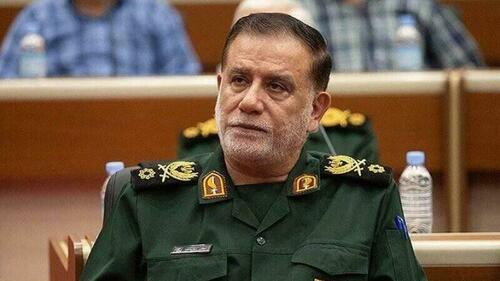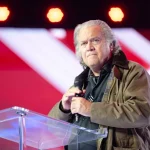
A high-ranking Iranian military officer who was considered a "key figure" that oversaw Tehran's support to the 'resistance axis' abroad was slain in the Israeli airstrike which killed Hezbollah Secretary-General Hassan Nasrallah on September 27 in south Beirut.
Iran had soon after the Israeli attack confirmed the death the IRGC's #2, Brigadier General Abbas Nilforoushan. But his body had not been found even long after Nasrallah's remains were recovered. Iran's government had vowed that his killing "will not go unanswered."

The IRGC deputy commander's body was finally recovered on Friday by Lebanese search and rescue workers, regional media has announced, a full two weeks after the strike:
The Public Relations Department of the Iranian Revolutionary Guard Corps (IRGC) has announced that the body of IRGC Brigadier General Abbas Nilforoushan has been found.
On September 27, Nilforoushan was killed by Israeli strikes in Beirut. Hezbollah leader Hassan Nasrallah was also killed in the attack.
The assassinations, along with the killing of Hamas leader Ismail Haniyeh in Tehran, triggered Iran’s retaliatory attack on Israel, in which it fired almost 200 ballistic missiles on October 1.
The fact that there was enough rubble to bury his remains to the point that the body took two weeks to recover speaks to the enormity of the bombs' impact and destruction.
The strikes have been described as happening as a high-level meeting between Nasrallah and top Iranian officials was taking place. It's believed that the meeting was being held in a bunker underneath office or apartment buildings.
Israel likely used heavy US-supplied 'bunker busters' to penetrate that far down. Hezbollah and Iranian officials attending the meeting were essentially buried under the massive layers of rubble.
According to a backgrounder on the slain Gen. Nilforoushan:
Born in Isfahan in 1966, Nilforoushan began his military activities in the 1980s joining the Basij and later the IRGC, holding various positions including Deputy Commander of the IRGC Ground Forces for Operations.
Iranian media outlet Student News Network (SNN) described Nilforoushan as a “key figure” with extensive battlefield experience who played a crucial role in supporting the “Resistance Axis, including Hezbollah in Lebanon and Palestinian resistance groups,” helping to strengthen their capabilities against Israel.
Following the assassination of IRGC General Mohammad Reza Zahedi in an Israeli attack on the Iranian consulate in Damascus in April, Nilforoushan “assumed command of the Lebanon front,” according to the Tehran-based Fararu website.
The Islamic Revolution Guard Corps (IRGC) has confirmed the recovery of the body of Commander Abbas Nilforooshan, following tireless efforts by specialized teams. pic.twitter.com/9sJTKItakm
— Tehran Times (@TehranTimes79) October 11, 2024
Hezbollah has since claimed to have reconstituted its command and communications structure, but it's anything but clear who exactly leads the paramilitary organization at this point. Likely no specific name will be publicized anytime soon, given the person would immediately become a top target of Israel.
A high-ranking Iranian military officer who was considered a “key figure” that oversaw Tehran’s support to the ‘resistance axis’ abroad was slain in the Israeli airstrike which killed Hezbollah Secretary-General Hassan Nasrallah on September 27 in south Beirut.
Iran had soon after the Israeli attack confirmed the death the IRGC’s #2, Brigadier General Abbas Nilforoushan. But his body had not been found even long after Nasrallah’s remains were recovered. Iran’s government had vowed that his killing “will not go unanswered.”

The IRGC deputy commander’s body was finally recovered on Friday by Lebanese search and rescue workers, regional media has announced, a full two weeks after the strike:
The Public Relations Department of the Iranian Revolutionary Guard Corps (IRGC) has announced that the body of IRGC Brigadier General Abbas Nilforoushan has been found.
On September 27, Nilforoushan was killed by Israeli strikes in Beirut. Hezbollah leader Hassan Nasrallah was also killed in the attack.
The assassinations, along with the killing of Hamas leader Ismail Haniyeh in Tehran, triggered Iran’s retaliatory attack on Israel, in which it fired almost 200 ballistic missiles on October 1.
The fact that there was enough rubble to bury his remains to the point that the body took two weeks to recover speaks to the enormity of the bombs’ impact and destruction.
The strikes have been described as happening as a high-level meeting between Nasrallah and top Iranian officials was taking place. It’s believed that the meeting was being held in a bunker underneath office or apartment buildings.
Israel likely used heavy US-supplied ‘bunker busters’ to penetrate that far down. Hezbollah and Iranian officials attending the meeting were essentially buried under the massive layers of rubble.
According to a backgrounder on the slain Gen. Nilforoushan:
Born in Isfahan in 1966, Nilforoushan began his military activities in the 1980s joining the Basij and later the IRGC, holding various positions including Deputy Commander of the IRGC Ground Forces for Operations.
Iranian media outlet Student News Network (SNN) described Nilforoushan as a “key figure” with extensive battlefield experience who played a crucial role in supporting the “Resistance Axis, including Hezbollah in Lebanon and Palestinian resistance groups,” helping to strengthen their capabilities against Israel.
Following the assassination of IRGC General Mohammad Reza Zahedi in an Israeli attack on the Iranian consulate in Damascus in April, Nilforoushan “assumed command of the Lebanon front,” according to the Tehran-based Fararu website.
The Islamic Revolution Guard Corps (IRGC) has confirmed the recovery of the body of Commander Abbas Nilforooshan, following tireless efforts by specialized teams. pic.twitter.com/9sJTKItakm
— Tehran Times (@TehranTimes79) October 11, 2024
Hezbollah has since claimed to have reconstituted its command and communications structure, but it’s anything but clear who exactly leads the paramilitary organization at this point. Likely no specific name will be publicized anytime soon, given the person would immediately become a top target of Israel.
Loading…





